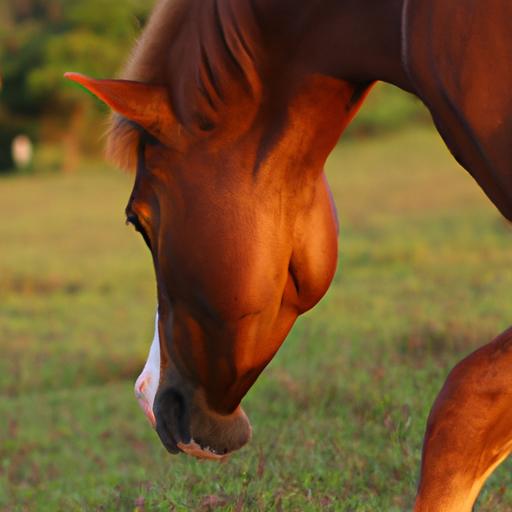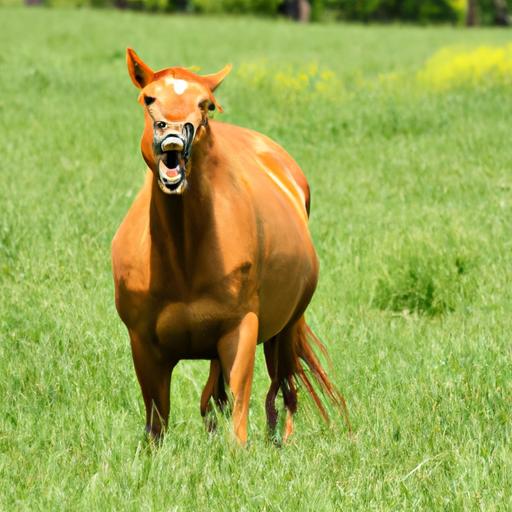Uncover the secrets of horse behavior squealing! Learn effective management techniques, training methods, and the importance of exercise and socialization.
Introduction

When we observe horses, their mysterious and captivating behaviors often leave us wondering what lies beneath their actions. One such behavior that piques our curiosity is horse behavior squealing. Have you ever found yourself questioning why horses squeal and what it signifies? Well, you’re not alone! Understanding the language of equine communication is crucial for any horse enthusiast or owner.
Understanding Horse Behavior Squealing
Horse behavior squealing refers to the vocalizations made by horses, producing distinct high-pitched sounds. These vocalizations can vary in intensity, duration, and pitch, providing valuable insights into their emotions, needs, and social interactions. By delving into the reasons behind this behavior, we can unlock a deeper understanding of our equine companions.
Importance of Studying Horse Behavior
Just like humans, horses possess a complex range of emotions and behaviors. By studying horse behavior, we gain insight into their psychological well-being, enhance our ability to communicate effectively, and foster stronger bonds with these magnificent creatures. Understanding horse behavior squealing is a fundamental aspect of this study, as it can shed light on their feelings, motivations, and responses to various stimul
Overview of the Article
In this comprehensive article, we will explore the intricacies of horse behavior squealing, providing you with valuable knowledge that will enable you to interpret and respond to your horse’s vocalizations effectively. We will delve into the reasons behind horse squealing, decipher the meaning behind different types of squeals, and discuss how to interpret their body language and vocalization patterns. Additionally, we will provide insights on managing and addressing horse squealing, ensuring the well-being and harmony of both horse and rider.
So, saddle up and embark on this journey with me as we unravel the secrets of horse behavior squealing, gaining a deeper understanding of our equine friends and fostering a stronger connection based on trust and communication. Together, we will unlock the language of horses and embark on a remarkable journey of horsemanship. Stay tuned for the next section!
What is Horse Behavior Squealing?
Definition and Explanation
Horse behavior squealing is a vocalization that horses use to communicate a wide range of emotions and needs. It is characterized by high-pitched sounds that can vary in intensity and duration. These vocalizations serve as a form of language for horses, allowing them to express their feelings and convey important messages to other horses and humans alike.
Squealing can be a natural and normal behavior in horses, but it is essential to understand the context and underlying reasons behind it to interpret its meaning accurately. By decoding horse behavior squealing, we can gain valuable insights into their well-being, social interactions, and overall emotional state.
Common Triggers for Squealing in Horses
Horses may squeal in response to various triggers and situations. Understanding these common triggers can help us decipher the meaning behind their vocalizations. Some of the most prevalent triggers for horse behavior squealing include:
-
Social Interactions: Horses are highly social animals, and squealing often occurs during herd dynamics. It can serve as a means of communication between horses, expressing dominance, submission, or establishing boundaries within the group.
-
Reproductive Behaviors: Breeding and sexual behaviors can also prompt horses to squeal. Stallions may use vocalizations to attract mares or assert their dominance during courtship, while mares may squeal to indicate their receptiveness or discomfort during breeding.
-
Pain or Discomfort: Horses may squeal when experiencing physical pain or discomfort. It could be a response to injuries, illness, digestive issues, or even discomfort caused by ill-fitting tack or improper riding techniques.
-
Fear, Anxiety, and Aggression: Horses may squeal when feeling threatened, fearful, or experiencing high levels of stress. It can serve as a warning signal to other horses or an expression of their own distress.
Different Types of Horse Squeals
Horse behavior squealing can manifest in different types, each with its own distinct characteristics and meanings. Understanding these variations can help us better interpret the horse’s emotions and intentions. Some common types of horse squeals include:
-
Playful Squeals: These are often high-pitched and short in duration, expressing joy and excitement during social interactions or playful activities among horses.
-
Aggressive Squeals: Aggressive squeals are typically intense, loud, and prolonged. They may indicate dominance disputes, territorial behavior, or conflicts between horses.
-
Painful Squeals: These squeals are often accompanied by signs of discomfort, such as a tense body posture or other signs of distress. They serve as a communication tool for horses to express pain or discomfort they are experiencing.
By understanding the definition, triggers, and different types of horse behavior squealing, we can begin to decipher the intricate language of equine communication. In the next section, we will explore the reasons behind horse behavior squealing in more detail. So, let’s delve deeper into the captivating world of horse vocalizations!
The Reasons behind Horse Behavior Squealing
Horse behavior squealing serves as a powerful means of communication for our equine companions. By understanding the various reasons behind their vocalizations, we can decipher their messages and respond appropriately. Let’s explore the different motivations behind horse squealing:
Communication and Social Interaction
Horses are highly social animals, and vocalizations play a vital role in their communication with other herd members. Squealing can indicate greetings, invitations to play, or expressions of dominance and submission. When horses engage in social interactions, such as establishing pecking orders or inviting companions to join them, they may emit distinct squeals that convey their intentions and maintain harmony within the herd.
Expressing Pain or Discomfort
Horse behavior squealing can also serve as an indication of physical discomfort or pain. When horses experience discomfort, whether from injuries, illness, or improper equipment, they may emit prolonged and intensified squeals. It is crucial for horse owners and caretakers to be attentive to these vocalizations as they can signify the need for immediate attention or veterinary care.
Reproductive and Sexual Behaviors
During breeding seasons or when in the presence of a potential mate, horses may engage in specific vocalizations to attract attention or demonstrate their readiness for reproduction. Mares in heat often emit high-pitched squeals to communicate their receptiveness, while stallions may respond with their own vocalizations to express their interest or assert dominance.
Fear, Anxiety, and Aggression
Fear, anxiety, and aggression can trigger horse behavior squealing as a response to perceived threats or stressful situations. Horses may emit sharp, intense squeals when they feel threatened or are engaged in territorial disputes. Understanding the context and body language accompanying these vocalizations is essential for interpreting their emotional state accurately and taking appropriate measures to ensure their safety and well-being.
By comprehending the various motivations behind horse behavior squealing, we can better understand their needs, emotions, and intentions. In the next section, we will explore how to interpret horse squealing by examining their body language and vocalization patterns. Stay tuned as we dive deeper into the fascinating world of equine communication!
How to Interpret Horse Squealing
Understanding the meaning behind horse squealing goes beyond simply hearing the sound. To truly decipher their communication, it is essential to pay attention to their body language, facial expressions, vocalization patterns, and context. Let’s explore some key factors that will help you interpret horse squealing effectively.
Body Language and Facial Expressions
Horses are masters of non-verbal communication. Their body language and facial expressions can reveal a wealth of information about their emotional state. When interpreting horse squealing, observe their overall posture, tail movement, ear position, and eye expression. A tense body, pinned ears, and wide eyes may indicate fear or aggression, while relaxed muscles, forward ears, and soft eyes suggest contentment or playfulness. By combining these visual cues with vocalizations, you can gain a deeper understanding of what your horse is trying to convey.
Vocalization Patterns and Context
Horse squealing can vary in pitch, duration, and intensity, each carrying its own message. Pay attention to the timing and context of the vocalization. Is it during feeding time, social interactions, or when ridden? A high-pitched squeal during feeding may indicate excitement or anticipation, while a prolonged, intense squeal during social interactions could signify dominance or a warning. By considering the situation and the horse’s previous behavior, you can better interpret the meaning behind their vocalizations.
Recognizing Distress or Warning Signs
Sometimes, horse squealing can indicate distress, pain, or discomfort. If your horse suddenly starts squealing excessively or in a different manner than usual, it is crucial to investigate further. Look for other accompanying signs such as restlessness, pawing, tail swishing, or unusual breathing patterns. These may be warning signs of underlying health issues or discomfort. Consult with a veterinarian to rule out any potential medical causes and ensure the well-being of your equine companion.
Differentiating between Playful and Aggressive Squeals
Horses can squeal to express both playfulness and aggression. Playful squeals are often high-pitched, short, and accompanied by playful movements such as playful nipping or running. On the other hand, aggressive squeals tend to be louder, longer, and may be accompanied by defensive behaviors like flattening ears or biting. Observe the overall context, body language, and the presence or absence of aggressive behaviors to accurately differentiate between these two types of squeals.
By understanding and interpreting the various aspects surrounding horse squealing, you can effectively decode their communication, fostering a stronger bond and ensuring their emotional well-being. Now, let’s move on to the next section, where we will explore techniques for managing and addressing horse squealing.
Conclusion
As we bring this journey of understanding horse behavior squealing to a close, it is evident that these vocalizations hold significant value in deciphering the language of equine communication. By delving into the reasons behind horse squealing and learning to interpret their body language and vocalization patterns, we can deepen our connection with these magnificent creatures and ensure their well-being.
At Horsemasterypro.com, we are passionate about promoting responsible horse ownership and fostering strong bonds between horses and their human counterparts. By creating a safe and comfortable environment for our equine friends, implementing effective training and behavior modification techniques, seeking veterinary assistance when necessary, and prioritizing regular exercise and socialization, we can address and manage horse squealing in a holistic manner.
Remember, horses rely on us to understand their needs and emotions, and it is our responsibility to meet them with empathy and care. By honing our knowledge of horse behavior squealing, we can become better horsemen and horsewomen, cultivating relationships built on trust, respect, and effective communication.
So, whether you’re a seasoned rider or a newcomer to the world of horses, embrace the journey of understanding horse behavior squealing. By delving into the language of equine communication, you embark on a remarkable path towards horsemanship mastery. Join us at Horsemasterypro.com as we continue to explore the intricate world of horses and deepen our connection with these extraordinary creatures.
Together, let’s unlock the secrets of horse behavior squealing, forging a bond that transcends words and speaks directly to the soul. Remember, at Horsemasterypro.com, we’re here to support you every step of the way on your journey to becoming a confident and compassionate horse owner.


